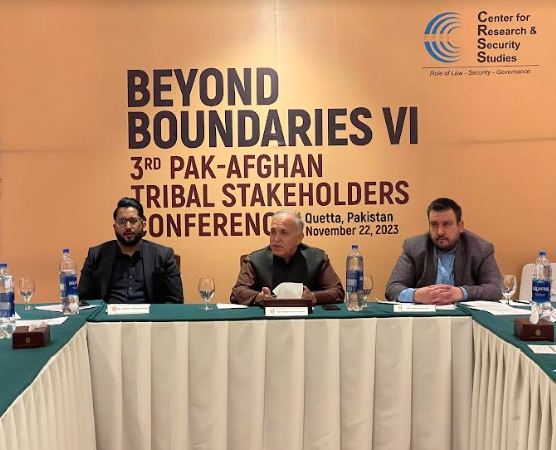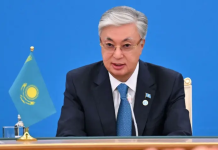DNA
ISLAMABAD, NOV 27: /DNA/ – A regulated refugee policy and periodic return of undocumented and displaced Afghans could have prevented the current refugee crisis and the increased tension between Pakistan and Afghanistan resulting from this policy shift. This observation was made by the participants of the 3rd Pakistan-Afghan Tribal Stakeholders Conference, held in Quetta, Pakistan, convened by the Center for Research and Security Studies (CRSS).
Hailing from the Spin Boldak and Chaman border regions, the chieftains and community influencers collectively called for the formulation and implementation of policies to strengthen bilateral relations and address common challenges.
The participants acknowledged the shared problems faced by both countries and urged more steps to be taken, focusing on unresolved issues. “I believe that we should move past petty grievances to improve relations and address more crucial problems that need our utmost attention, i.e., sending the undocumented Afghans back home with dignity and their rehabilitation,” said a Pakistani participant.
Another added that there has been undue backlash against Pakistan because of this policy. “Would any of our neighboring countries or those in the West ever take migrants who are undocumented/illegal? It must be remembered that Pakistan still has a great number of Afghan refugees that are documented. A country that has long been grappling with its own domestic issues still comes forward and offers help to the Afghans in need – sadly the world forgets favors as such,” he noted.
Trade and economic issues also took center stage during the discussions. Highlighting the potential for increased trade volume between the two nations, it was noted that 5 to 8 thousand people from the Chaman border engage in daily business activities, benefiting the livelihoods of thousands of families. “The new visa policy will certainly affect this trend. Hence, the governments and the international community need to create alternative business opportunities for these personnel and families,” said an Afghan participant. Another added, “The economic impact of banning certain items has resulted in a substantial loss for traders from both countries.” Had the ban been imposed earlier, traders could have avoided fines and losses. In such matters, smooth and timely communication is the key, he proposed.
The forum applauded the Afghan authorities’ stringent and dedicated efforts in curtailing and eventually eradicating poppy cultivation. However, the Pakistani side expressed concerns regarding the recent involvement of Afghan businesspersons in the poppy cultivation business on the Pakistani side. Urgent measures were urged by the Pakistani representatives, emphasizing the need for decisive government actions to curb the proliferation of poppy cultivation in Pakistan as well.
In the context of peace and security, Pakistani tribal leaders urged Islamic Emirate of Afghanistan (IEA) to take action against Tehrik-i-Taliban Pakistan (TTP). The forum asserted that terrorism and the actions of non-state actors are fostering a divide between the two nations, and it is imperative that such activities be addressed through stringent measures.
Afghan girls’ education matter was discussed thoroughly. Both sides urged the Afghan government to review the arrangements and deliver on its promise of providing adequate and safe environments for girls and women to pursue their scholarly dreams so they can participate in the restabilization and rebuilding of the Afghan nation. “This needs to be done on an urgent basis because we are seeing a decline in female professionals in various fields, including medicine and health. These are not good signs,” said an Afghan speaker. The gathering emphasized the importance of providing facilities and infrastructure, including female teachers and washrooms, to overcome educational challenges in the border areas of Chaman and Spin Boldak.
Both sides acknowledged the importance of including tribal representatives in the discourse on bilateral issues. They appreciated CRSS’s effort of initiating and continuing such an unconventional idea at the heart of which is the indigenization of people-to-people diplomacy – through the most relevant and organic actors: tribal leaders.

















